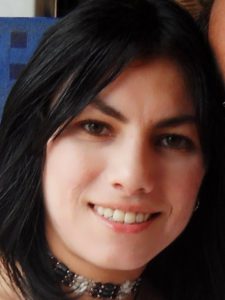Diana Maria Valencia Duarte is a PGR in History at the University of Exeter, UK. Her research is an environmental history of food security and food sovereignty in the Colombian peasant landscape, reviewing impacts on food culture and agroecosystems resulting from the practical resolution of Agrarian Reforms and counter-reforms.
‘Being a PGR is the most amazing and at the same time challenging thing I have ever done’, Dr. Dani Hilliard said to me last week. And for me, it has indeed been an adventure in every way. The first year of training in my new field of Humanities, fieldwork in the countryside, and now writing my thesis…
Writing is perhaps the most challenging of all. To demonstrate, I will share my personal, very personal experience with you all.
My relationship with writing is like a lifetime romance, a story of meetings and partings. My love for reading and writing started with my first vowels – I will never forget how wonderful the world looked when I could finally read every sign in the streets. My fascination with reading was unpopular where I grew up, bookshelves were only for schools or libraries – except for my dad, who had an ever-growing personal collection. In high school I wanted to be a writer, and I confess I wrote a small novel, in weekly deliveries, for my classmates – who loved it. At university I wrote poetry, but after graduation I started working life and abandoned the quill. I learnt English grammar with the British Council, and for my Masters’ here in Exeter I learnt to write academically for sciences. However, it is being a PGR which has breathed new life into the writer-girl in me.
Although the magic of words enchanted me in the past, it has not been easy to find my way back. Not only is the English I now write in not my native tongue, but the passion and dedication of youth, which found inspiration in beauty, deep feelings, future, life have slept for so long. My daily PGR life is very patchwork: reading, planning, writing ten things at once, checking mail, catching up with friends, housekeeping, networking… sitting down and writing, JUST-writing seems almost impossible. Sometimes it has been the opposite, spending hours writing, forcing myself to keep on going, on and on, doing and undoing paragraphs, because often the result of all those hours is unsatisfactory. My lack of method stymied my progress; Write Club and its techniques rescued me.
My first Write Club was two years ago, facilitated by Kelly Preece and Sally Flint. What happened then, I certainly did not expect. Sally asked us to leave our thesis concerns aside, and presented us with a picture of a countryside house to creatively tell a story. Through this exercise, Sally’s inspirational words reminded me of ‘the basics’ – not in terms of grammar rules or academic writing, but the writer’s spirit. Those ten minutes reminded me of the family house I left behind, the smell of Colombian coffee, my old dad’s teary eyes when we visited our peasant ancestors’ lands. My work’s ‘muse’. I will never forget Sally’s final words in that session: ‘Being a researcher means being a writer, you are writers.’ YOU – ARE – WRITERS. Wow. It was an incredibly powerful revelation. I had wanted to be a writer when I was 15, now I could not believe I actually was one. Yet Sally was right – I needed that profound realisation to internalise those words and fully play this role. After this epiphany, I never missed a Write Club if I could, and when Kelly offered facilitation training, I did not think twice.
Why not just take part in Write Club – why become a facilitator? The Write Club stands by itself with enormous advantages as a community of practice. To me the difference between PGR in the context of my PhD studies and other studies I have undertaken before, is that we learn through practice. The realisation of being a ‘practitioner’ – someone who learns through an iterative and methodical process, based in continuous improvement – was almost as important as being a ‘writer’. It means that building knowledge on ‘how it is done’ is as important as the ‘results’, and is needed to achieve not just your writing but your writer’s goals: how good a writer do you want to become, not just how many words should you write. By facilitating Write Clubs, I have taken the additional challenge of preparing creative and encouraging activities, discussions, and reflections. I also hope to help my peers by ‘being in charge’ while we develop our writing production, as others have done – and still do – for me.
It is a universal truth what you give comes back a thousand times. Every time I run a Write Club, I learn from every participant. I am constantly inspired by their commitment, their professionalism, passion, and clarity, and by their feedback.
Paraphrasing Dr. Hilliard ‘Writing my thesis would be the most amazing and at the same time challenging thing I might ever do’. This experience definitely would not be the same without facilitating Write Club.
Written by: Diana Valencia. Find out more about Diana and her research through her university profile and research project webpage. Diana is also a blogger for https://envhistnow.com, podcaster for @poslaverda and @enkarretados (Spanish). You can find her on twitter @DIANA_VAL.

